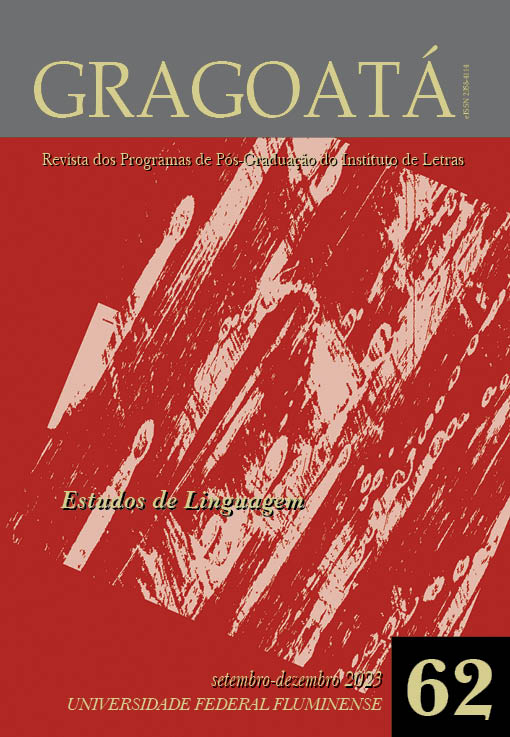Political time and space: the integration between arguments marked by deictic adverbs in electoral interviews
DOI:
https://doi.org/10.22409/gragoata.v28i62.58341.ptKeywords:
Deictic adverbs. Argumentantion. Verbal interaction. Interviews with politicians.Abstract
This paper analyzes the deictic adverbs’ textual-interactive function of integration between arguments (NEVES, 2020) in interviews with political personalities. In order to understand this function, time and space deictic adverbs were identified in these interviews, categorizing them according to their semantic values and explaining their operating patterns in the genre textualization. The data correspond to interviews with eligible candidates for the Recife mayor's office in the first electoral round of 2020. As already mentioned, adverbs’ occurrences were examined according to the speakers’ intentions within the communicative situation undertaken by the textual genre and with the perception of how deictics are inserted in the construction of utterances. Furthermore, the analysis had as main theoretical foundations the contributions of Text Linguistics (KOCH, 2015) to take the text as a unit of analysis and to understand the relationship between adverbs and textual segments. The results showed that there was a transition from deictic ostension to textual organization, so that deictic, in certain instances, began to play argumentative / opinionated roles. The insertion of adverbs did not occur equally in all arguments, and it is possible to find comparisons, emphasis, confirmations, among other processes in which the deictic helps to manifest the interactive purposes of criticism, agreement or discursive redirection.
Downloads
Downloads
Published
How to Cite
Issue
Section
License
Copyright (c) 2023 Gragoatá

This work is licensed under a Creative Commons Attribution 4.0 International License.
Authors who publish in Gragoatá agree to the following terms:
The authors retain the rights and give the journal the right to the first publication, simultaneously subject to a Creative Commons license CC-BY-NC 4.0, which allows sharing by third parties with due mention to the author and the first publication by Gragoatá.
Authors may enter into additional and separate contractual arrangements for the non-exclusive distribution of the published version of the work (for example, posting it in an institutional repository or publishing it in a book), with recognition of its initial publication in Gragoatá.

Gragoatá is licensed under a Creative Commons - Attribution-NonCommercial 4.0 International.














